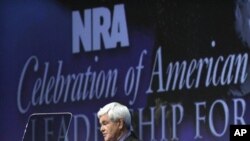Former U.S. house speaker Newt Gingrich is formally entering the 2012 presidential race this week. Gingrich will announce his plans through social media sites Facebook and Twitter as the competition for the Republican Party's presidential nomination begins to heat up.
Newt Gingrich came to national prominence in the 1990's when he led a Republican resurgence in Congress that resulted in Republicans winning control of both the House of Representatives and the Senate in 1994 for the first time in 40 years.
Gingrich became Speaker of the House and became the main Republican counterpoint to President Bill Clinton, though at times the two found enough common ground to work together on issues like welfare reform.
Gingrich resigned from Congress in 1999 and ever since has focused on writing books and staking out conservative policy positions, especially on foreign policy issues.
Gingrich lashed out at President Barack Obama's approach to foreign policy during a speech a few months ago at a conservative conference in Washington.
"The Obama administration is wrong on terrorism, wrong on Iran, wrong on the Muslim Brotherhood, wrong on Hezbollah, and being wrong on that many national security items is an enormously dangerous thing," Gingrich said.
Public-opinion polls suggest Gingrich remains a polarizing political figure, much as he was during the 1990s. Gingrich is usually rated in the top four or five Republican presidential contenders, but the public as a whole is split. A recent Reuters/Ipsos poll found Gingrich was viewed favorably by 35 percent of those surveyed, while 38 percent viewed him unfavorably.
Gingrich is popular with conservatives for his combative nature and his foreign policy views. But social conservative activists have long had reservations about his acknowledgement of marital infidelity and two failed marriages.
Gingrich plunges into a Republican race that has been slow to form and features no less than a dozen potential contenders who are either considering a run for the White House or who have taken initial steps to explore a candidacy.
Political analysts say there is no clear-cut frontrunner for the Republican nomination, though former Massachusetts governor Mitt Romney continues to hold modest leads in most early public-opinion polls.
Romney recently spoke in the northeastern state of New Hampshire, which traditionally holds the first presidential primary in the U.S. election cycle.
"We are pioneers, freedom-lovers, freedom-seekers, innovators, champions, and we are not going to let Barack Obama of the Democrats or the liberals take that away from America," Romney said.
Other Republicans who have taken initial steps toward a run include former Minnesota governor Tim Pawlenty, former Pennsylvania senator Rick Santorum, former New Mexico governor Gary Johnson, Texas Congressman Ron Paul and Georgia businessman Herman Cain, the only African-American to signal interest so far.
There is another group said to be weighing whether to join the race that includes Indiana Governor Mitch Daniels, Minnesota Congresswoman Michele Bachmann and former Utah governor Jon Huntsman, who until recently served as President Obama's U.S. ambassador to China. In addition, New York businessman Donald Trump says he will decide on a presidential run next month.
Some Republican voters appear unsure about the current group of potential contenders and are eager to hear from candidates who are new to the national stage.
Political analysts say the Republican field has been slow to form for 2012, especially compared to four years ago when several declared candidates were already running for the party nomination.
Matt Dallek teaches politics at the University of California's Washington Center.
"There is just not a kind of excitement level there that you would expect to see, given especially at how effective Republicans have been over the past four decades at identifying a top candidate very early on and riding that candidate in the presidential race," noted Dallek.
Some Democrats see the slow-developing field of contenders as a sign of weakness for the Republican Party. But Washington-based analyst Rhodes Cook says he remembers the early stage of the 1992 presidential campaign when then President George H. W. Bush appeared to be unbeatable following the victory of the U.S.-led coalition in the Gulf War.
"I kind of remember back to 1991 after the Gulf War victory and how the Democratic [presidential] field looked so weak," Cook recalled. "It was called the 'Seven Dwarfs', and it turned out that one of the 'Seven Dwarfs' was Bill Clinton who won the White House in 1992. So conditions can change and what looks like a weak field can actually produce a strong candidate."
More contenders are expected to formally announce their plans in the next few weeks. But so far there is little indication that two former Republican governors with loyal supporters, Mike Huckabee of Arkansas and Sarah Palin of Alaska, are actively taking steps toward a White House bid next year.





